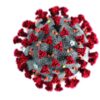![1]()
News
COVID-19–associated coagulopathy
May 7, 2020
Early recognition and anticoagulation is imperative to improve clinical outcomes in COVID-19–associated coagulopathies.
![1]()
News
Adding mechanical to pharma prophylaxis does not cut DVT incidence
May 4, 2020
Does adding mechanical prophylaxis to pharmacological prophylaxis lower the incidence of deep-vein thrombosis (DVT)?
![1]()
News
Predictors of ICH after thrombectomy identified
April 30, 2020
The sum of three variables may predict which patients undergoing thrombectomy up to 24 hours after a stroke are at higher risk of developing symptomatic intracranial hemorrhage.
![1]()
News
AUGUSTUS: After ACS or PCI, aspirin gives AFib patients scant benefit
April 24, 2020
Adding aspirin to an anticoagulant and P2Y12 inhibitor showed no net benefit, even acutely, suggesting need to target aspirin to highly selected patients.
![1]()
News
ACEI/ARBs linked with survival in hypertensive, Chinese COVID-19 patients
April 22, 2020
A study drawing from 1,128 hypertensive, Chinese patients with COVID-19 suggested that those on an ACEI or ARB had better 28-day survival.
News
Mislabeled clopidogrel lot recalled, may contain simvastatin
April 21, 2020
International Laboratories has recalled one lot of clopidogrel tablets packaged in bottles of 30 tablets because it may contain simvastatin instead of clopidogrel.
![1]()
News
PCSK9 inhibitors unexpectedly link with lower VTE, aortic stenosis
April 21, 2020
Post hoc analyses of data from as many as 46,000 patients showed surprising links between PCSK9 inhibition and reduced rates of VTE and aortic stenosis.
News
Larger absolute rivaroxaban benefit in diabetes: COMPASS
March 29, 2020
The new vascular low dose of rivaroxaban has had a slow start, but these results may stimulate use in patients with diabetes and stable disease.
![1]()
News
AUGUSTUS: Apixaban surpassed warfarin despite prior stroke or thromboembolism
March 7, 2020
LOS ANGELES – Secondary AUGUSTUS analysis showed ACS/PCI patients with AFib plus prior stroke, TIA, or thromboembolism did better on apixaban.
![1]()
News
AFib patients do best on a DOAC started 7-10 days post stroke
March 4, 2020
LOS ANGELES – Observational data hints at the best time to start oral anticoagulation in AFib patients after a cardioembolic stroke.







